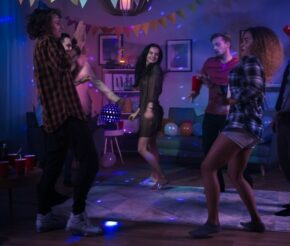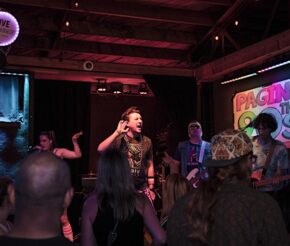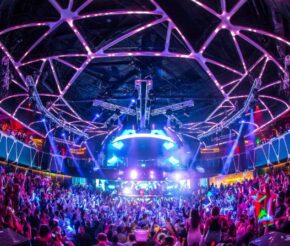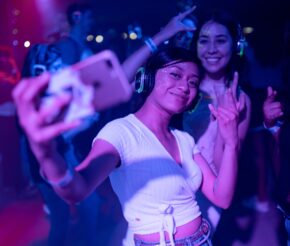- Advertise
-
Subscribe
Sober Socializing After Years of Drinking

It’s no secret that in most cultures, socializing has alcohol at its core. Whether you’re grabbing a pint with colleagues on a Tuesday post-work, meeting up with a Tinder date at a bar, or attending live shows with friends where alcohol flows through the crowd – booze is an unavoidable part of social interaction.
So what happens when people decide to cut alcohol out of their lives?
It’s one thing to not be a big drinker, but many people find it challenging to cut their habits of frequent drinking, simply because their social life is entirely built around it.
We spoke to a few people who decided to go sober after at least five years of drinking to understand what sober socializing is like.
You might feel isolated
And we’re not saying you need alcohol in any way to feel less isolated. When you decide to quit but remain in social settings where everyone around you continues on with their drinking habits, it can feel isolating.
Clara*, 21, says that even after starting to socialize without alcohol, many of her social gatherings remained alcoholic outings. “Sometimes being the only sober person in a room of people drinking can be lonely.”

At the end of the day, social gatherings are collective-shared experiences. When alcohol is added to the socializing recipe, boozy jokes and drunken stories that you might tell your kids someday arise. In all honesty, those elements make social bonds stronger.
When you’re sober around drunk friends, you might feel like you joined the party as an outcast.
“Sometimes being the only sober person in a room of people drinking can be lonely.”
Clara clarifies that just because you’re not part of the drinking gang, it doesn’t mean you can’t have fun and connect with the people around you. “Simply because someone is sober doesn’t mean they are unable to ‘let loose’ and enjoy themselves in a space like a party or an alcoholic gathering.”
People tend to mirror the energy of the room they are in. So even if you’re the only sober person, you can still channel the fun vibes of the people around you.
Socializing without alcohol? You’ll lose your ‘drinking buddies’
It can feel more anxiety-inducing to go about social interactions when sober, especially after being accustomed to having alcohol get you through it. But it is better than having alcohol-induced anxiety.
“When it comes down to it, if you are interacting with people you love who are drunk, they are still the people you love, just drunk.”

However, in most cases, the people you end up losing weren’t really friends at all. They were drinking buddies.
“A painful realization is that [some] friendships are partially if not significantly based on alcohol and not friendship.”
The line between genuine friends and drinking buddies is thin. But people don’t really care for the difference as long as they have someone they can have a pint with. When alcohol is taken out of the equation, what do you and your drinking buddies really have in common?
One Reddit user explained the painful realization that some friendships are partially (if not significantly) based on alcohol, not friendship. “Many friend groups that tend to drink often when getting together are actually gathering to get drunk as the main event”, he says. “We tell ourselves each time that we’re going out to hang out with friends… but when you remove alcohol, the enthusiasm to meet up always would have been lower.”
However, Clara said she doesn’t look back at the loss of such friends with any regret. “The only people I might have lost as I stopped drinking would probably all be categorized as mere drinking buddies that I have no real relationship with outside of that setting.”
It might feel polarizing, but you’ll eventually feel more present in the moment
Some social contexts are considered more closely linked to alcohol consumption than others, such as live music events, concerts, and holidays.
For example, St. Patrick’s Day is a holiday where the purpose is to hit the bars and get drunk while doing so.
The festival relative of St. Patrick’s Day aka Oktoberfest revolves around drinking beer. Not to mention that all concerts allow attendees to buy booze at the bar while enjoying the show.


But this doesn’t necessarily mean that you need alcohol to fully cherish an event. In fact, many people actually feel more connected to the music at the venues when they attend such events sober.
Following the initial anxiety of entering social settings without the safety clutch of alcohol subsides, you find yourself enjoying things that you wouldn’t have appreciated before.
After taking up sober socializing, many people have expressed feeling more present in the moment. Following the initial anxiety of entering social settings without the safety clutch of alcohol subsides, you find yourself enjoying the small things you wouldn’t have appreciated before.
This realization is shared by Clara as well. “I learned to appreciate conversations in the quieter moments than the loud lively parts of the night”, she states. “It was a hard transition at first, but it got easier the more comfortable I was with the dynamic.”
You’ll have less action-related anxiety
Many recovered alcoholics have been able to reap the benefits of sober socializing. “I enjoy my social life more now because I don’t have to worry about getting sloppy, or feel awful and anxious the next day”, says a Reddit user.
Basically, you save yourself the banging hangover – plus the anxiety that comes with it. You don’t have to search your phone for possibly embarrassing sent texts or waster pictures accidentally posted on your Instagram.

Better yet, you are in control of your actions. You never have to feel like the false confidence fuelled by alcohol pushed you into a situation you ended up regretting. Sober socializing pretty much sounds like a utopian universe.
Socializing without alcohol isn’t easy, but you’ll always find ways to have fun
For many people, alcohol is a one-way ticket to having a blast. And that’s not wrong in any way. It helps you loosen up and come together with friends over a shared activity.
But when you’re sober, you have to rely on yourself to find new ways to enjoy yourself. Eliminating alcohol completely from your life isn’t as easy as button switching.
It’s definitely different depending on a case-by-case basis. However, it boils down to how you can navigate social settings.
You don’t need a couple of Piña Coladas to get you through them.
*Names have been changed to protect the integrity of the interviewee.





